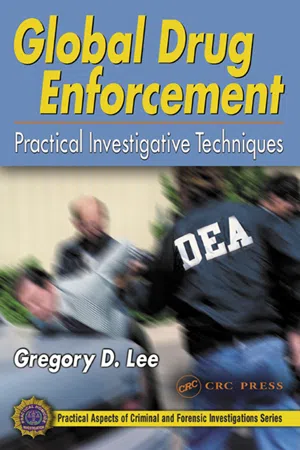
This is a test
- 440 pages
- English
- ePUB (mobile friendly)
- Available on iOS & Android
eBook - ePub
Book details
Book preview
Table of contents
Citations
About This Book
It's a national epidemic and an international conspiracy. Drugs have infested our society with a vengeance, making the drug enforcement agent a central figure in the war on drugs. International training teams of the U.S. Drug Enforcement Administration (DEA) have traditionally taught the special skills required by all drug agents. Until now, there
Frequently asked questions
At the moment all of our mobile-responsive ePub books are available to download via the app. Most of our PDFs are also available to download and we're working on making the final remaining ones downloadable now. Learn more here.
Both plans give you full access to the library and all of Perlego’s features. The only differences are the price and subscription period: With the annual plan you’ll save around 30% compared to 12 months on the monthly plan.
We are an online textbook subscription service, where you can get access to an entire online library for less than the price of a single book per month. With over 1 million books across 1000+ topics, we’ve got you covered! Learn more here.
Look out for the read-aloud symbol on your next book to see if you can listen to it. The read-aloud tool reads text aloud for you, highlighting the text as it is being read. You can pause it, speed it up and slow it down. Learn more here.
Yes, you can access Global Drug Enforcement by Gregory D. Lee in PDF and/or ePUB format, as well as other popular books in Law & Criminal Law. We have over one million books available in our catalogue for you to explore.
Appendix C:
U.S. Supreme Court Decision: U.S. v. Sokolow
U.S. v. SOKOLOW, 490 U.S. 1 (1989)
490 U.S. 1
U.S. v. SOKOLOW
CERTIORARI TO THE UNITED STATES COURT OF APPEALS FOR THE NINTH CIRCUIT
No. 87–1295.
Argued January 10, 1989
Decided April 3, 1989
Drug Enforcement Administration (DEA) agents stopped respondent upon his arrival at Honolulu International Airport. The agents found 1,063 grams of cocaine in his carry-on luggage. When respondent was stopped, the agents knew, inter alia, that (1) he paid $2,100 for two round-trip plane tickets from a roll of $20 bills; (2) he traveled under a name that did not match the name under which his telephone number was listed; (3) his original destination was Miami, a source city for illicit drugs; (4) he stayed in Miami for only 48 hours, even though a round-trip flight from Honolulu to Miami takes 20 hours; (5) he appeared nervous during his trip; and (6) he checked none of his luggage. Respondent was indicted for possession with intent to distribute cocaine. The District Court denied his motion to suppress the evidence, finding that the stop was justified by a reasonable suspicion that he was engaged in criminal activity, as required by the Fourth Amendment. The Court of Appeals disagreed and reversed respondent’s conviction, applying a two-part test for determining reasonable suspicion. First, ruled the court, at least one fact describing “ongoing criminal activity”—such as the use of an alias or evasive movement through an airport—was always necessary to support a reasonable-suspicion finding. Second, “probabilistic” facts describing “personal characteristics” of drug couriers—such as the cash payment for tickets, a short trip to a major source city for drugs, nervousness, type of attire, and unchecked luggage—were only relevant if there was evidence of “ongoing criminal activity” and the Government [490 U.S. 1, 2] offered “[e] mpirical documentation” that the combination of facts at issue did not describe the behavior of “significant numbers of innocent persons.” The Court of Appeals held the agents’ stop impermissible, because there was no evidence of ongoing criminal behavior in this case.
Held:
On the facts of this case, the DEA agents had a reasonable suspicion that respondent was transporting illegal drugs when they stopped him. Pp. 7–11.
(a) Under Terry v. Ohio, 392 U.S. 1, 30, the police can stop and briefly detain a person for investigative purposes if they have a reasonable suspicion supported by articulable facts that criminal activity “may be afoot,” even if they lack probable cause under the Fourth Amendment. Reasonable susp...
Table of contents
- Cover Page
- Title Page
- Copyright Page
- Dedication
- Editor’s Note
- Preface
- Author
- Acknowledgments
- Section I The Fundamentals
- Section II Complex Drug Investigations
- Glossary of Terms Common to Drug Law Enforcement
- Appendix A: Controlled Substance Act Schedules
- Appendix B: Controlled Substances Alphabetically
- Appendix C: U.S. Supreme Court Decision: U.S. v. Sokolow